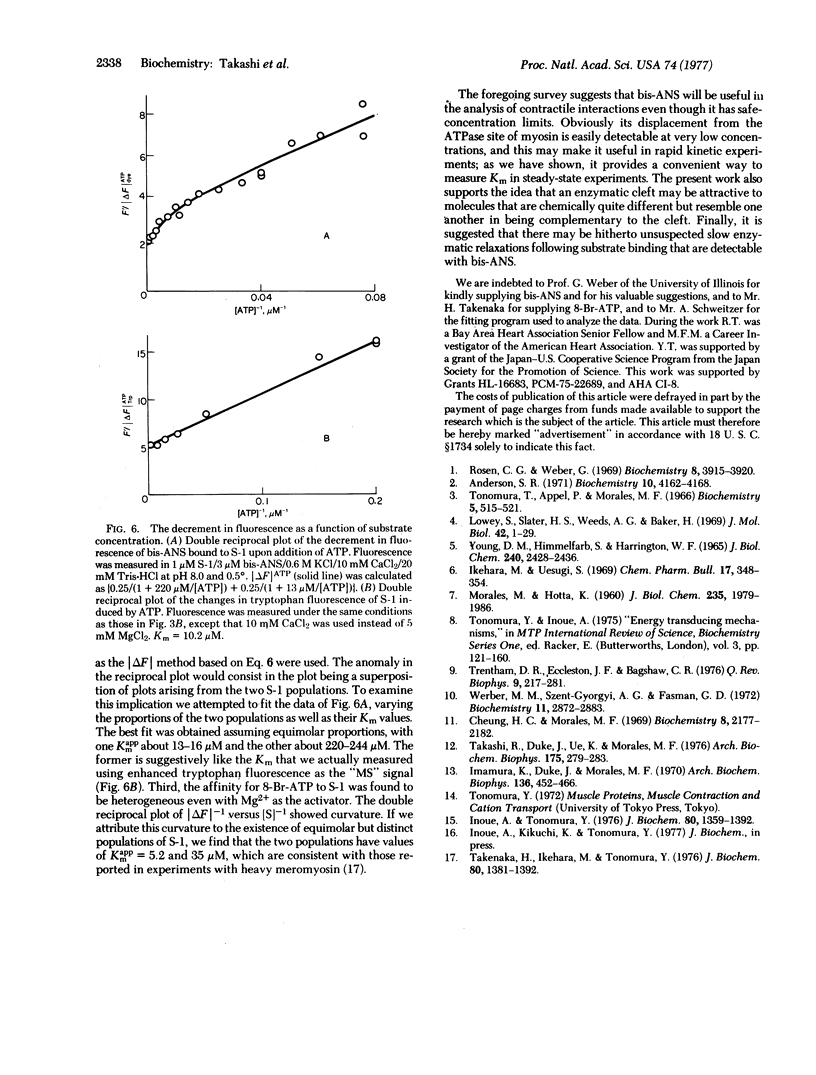Abstract
The interaction of myosin subfragment-1 (S-1) with 4,4'-bis(1-anilinonaphthalene 8-sulfonate) (bis-ANS) has been studied by monitoring the fluorescence of the latter when the two components form a complex. Because ATP and ATP analogs partially displace complexed bis-ANS it has also been possible to study interactions of S-1 and nucleotides by using the displacement effect. Approximate values of the parameters of these various interactions have been measured. Some possible applications of bis-ANS have been explored. For example, it provides a very convenient method for obtaining the Michaelis constant, Km, in steady-state S-1 nucleoside triphosphatase; this particular application has also provided some evidence for inferring that in Ca2+ (but not in Mg2+) adenosinetriphosphatase (ATP phosphohydrolase, EC 3.6.1.3) S-1 behaves like a mixture of two components, each with its own Km. Clear energy transfer occurs between tryptophan residues and bound bis-ANS. The fluorescence also suggests that S-1 undergoes some slow relaxations following substrate binding.
Full text
PDF




Selected References
These references are in PubMed. This may not be the complete list of references from this article.
- Anderson S. R. Selective adsorption of bis(1-anilino-8-naphthalenesulfonate) to the multiple forms of lactic dehydrogenase. Biochemistry. 1971 Nov;10(23):4162–4168. doi: 10.1021/bi00799a002. [DOI] [PubMed] [Google Scholar]
- Cheung H. C., Morales M. F. Studies of myosin conformation by fluorescent techniques. Biochemistry. 1969 May;8(5):2177–2182. doi: 10.1021/bi00833a059. [DOI] [PubMed] [Google Scholar]
- Ikehara M., Uesugi S. Studies on nucleosides and nucleotides. 38. Synthesis of 8-bromoadenosine nucleotides. Chem Pharm Bull (Tokyo) 1969 Feb;17(2):348–354. doi: 10.1248/cpb.17.348. [DOI] [PubMed] [Google Scholar]
- Imamura K., Duke J. A., Morales M. Studies on myosin catalysis and modification. Arch Biochem Biophys. 1970 Feb;136(2):452–466. doi: 10.1016/0003-9861(70)90217-1. [DOI] [PubMed] [Google Scholar]
- Inoue A., Tonomura Y. Structure and function of the two heads of the myosin molecule. II. Separation of the two fractions of subfragment-1 of myosin by affinity column chromatography on immobilized F-actin: direct evidence for acceleration by F-actin of the decomposition of the reactive enzyme-phosphate-ADP complex formed on head B of myosin. J Biochem. 1976 Dec;80(6):1359–1369. doi: 10.1093/oxfordjournals.jbchem.a131409. [DOI] [PubMed] [Google Scholar]
- Lowey S., Slayter H. S., Weeds A. G., Baker H. Substructure of the myosin molecule. I. Subfragments of myosin by enzymic degradation. J Mol Biol. 1969 May 28;42(1):1–29. doi: 10.1016/0022-2836(69)90483-5. [DOI] [PubMed] [Google Scholar]
- MORALES M. F., HOTTA K. The adenosine triphosphatase activity of myosin B treated with S-beta-aminoethylisothiuronium. J Biol Chem. 1960 Jul;235:1979–1986. [PubMed] [Google Scholar]
- Rosen C. G., Weber G. Dimer formation from 1-amino-8-naphthalenesulfonate catalyzed by bovine serum albumin. A new fluorescent molecule with exceptional binding properties. Biochemistry. 1969 Oct;8(10):3915–3920. doi: 10.1021/bi00838a006. [DOI] [PubMed] [Google Scholar]
- Takashi R., Duke J., Ue K., Morales M. F. Defining the "fast-reacting" thiols of myosin by reaction with 1, 5 IAEDANS. Arch Biochem Biophys. 1976 Jul;175(1):279–283. doi: 10.1016/0003-9861(76)90509-9. [DOI] [PubMed] [Google Scholar]
- Takenaka H., Ikehara M., Tonomura Y. Structure and function of the two heads of the myosin molecule. IV. Physiological functions of various reaction intermediates in myosin adenosinetriphosphatase, studied by the interaction between actomyosin and 8-bromoadenosine triphosphate. J Biochem. 1976 Dec;80(6):1381–1392. doi: 10.1093/oxfordjournals.jbchem.a131411. [DOI] [PubMed] [Google Scholar]
- Tonomura Y., Appel P., Morales M. On the molecular weight of myosin. II. Biochemistry. 1966 Feb;5(2):515–521. doi: 10.1021/bi00866a017. [DOI] [PubMed] [Google Scholar]
- Trentham D. R., Eccleston J. F., Bagshaw C. R. Kinetic analysis of ATPase mechanisms. Q Rev Biophys. 1976 May;9(2):217–281. doi: 10.1017/s0033583500002419. [DOI] [PubMed] [Google Scholar]
- Werber M. M., Szent-Györgyi A. G., Fasman G. D. Fluorescence studies on heavy meromyosin-substrate interaction. Biochemistry. 1972 Jul 18;11(15):2872–2883. doi: 10.1021/bi00765a021. [DOI] [PubMed] [Google Scholar]
- YOUNG D. M., HIMMELFARB S., HARRINGTON W. F. ON THE STRUCTURAL ASSEMBLY OF THE POLYPEPTIDE CHAINS OF HEAVY MEROMYOSIN. J Biol Chem. 1965 Jun;240:2428–2436. [PubMed] [Google Scholar]


